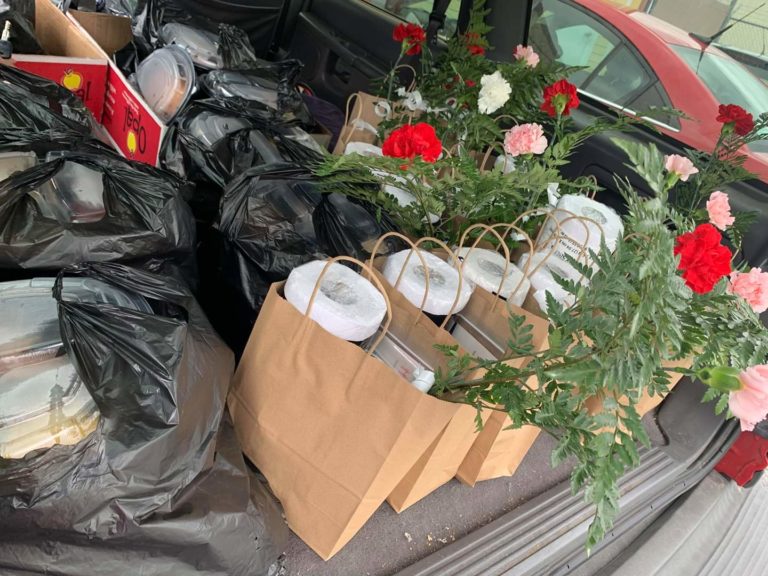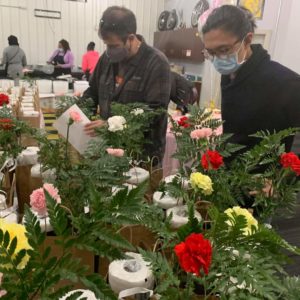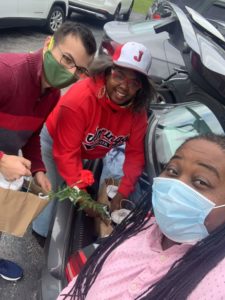
ESAL had the opportunity to talk with St. Louis Food Angels (STLFA), a volunteer-driven food security and public health initiative within St. Louis, MO. STLFA was founded by STEM students and alumni at Washington University in St. Louis (WashU) and Fontbonne University to help their local community during the COVID-19 pandemic. The non-profit organization aims to serve at-risk community members by handling last-mile deliveries for partners, to provide both grocery service and healthy food box donations. They have used innovative approaches to enable these efforts by developing an optimization algorithm for rapid delivery, applying technical skills to troubleshoot problems, and using efficient logistics in their operating model.
As each locality across the country has been impacted in numerous ways, there have been a notable number of scientists and engineers who have stepped up to contribute to the fight against COVID. This was no different in St. Louis. Students Abdalla Bani (MS, data analytics and statistics), Joanne Song (Masters, public), and Kay Park (MD/Ph.D.) had previously come together to address the link between food insecurity and the prevalence of chronic illnesses (e.g., hypertension and diabetes) seen in vulnerable residents living in food deserts. They wanted to find a systemic and creative solution that provides these communities greater access to healthy affordable food. To ensure a multi-disciplinary perspective, they recruited team members from diverse academic backgrounds including medicine, nutrition science, engineering, business, and public health.

STLA volunteers prepare bags for distribution.
Given the arrival of the pandemic, the team was quick to notice that vulnerable residents would require assistance with purchasing food and grocery supplies, and quickly shifted their operations to support at-risk populations. They partnered with Mike Pieper (CEO of Mode Health, a meal planning app) and started providing food and grocery delivery. Within St. Louis – as in the rest of the U.S. – high-risk populations include senior citizens, people with pre-existing chronic conditions (e.g., hypertension, diabetes, and liver disease), those who belong to a low socio-economic status, and those with insufficient access to healthcare services. STLFA’s mission became to minimize these populations’ exposure to COVID by delivering them food and groceries of nutritional value. The group developed a system in which an operator can create a grocery list with senior citizens (similar to an offline Instacart), and subsequently send a courier to shop and deliver the groceries. They also offer a delivery route optimization algorithm for non-profit organizations, which allows each volunteer to make more deliveries.
Park explained that STLFA operates with three moving parts: volunteers, non-profit organizations, and the at-risk populations who need food. The group recruited volunteers from different walks of life – initially students at WashU, then expanding to other local universities and community members – all of whom were willing and eager to find a way to give their time to support those in need. STLFA then connects the volunteers to non-profit organizations who have the existing infrastructure but require couriers to help with the last-mile deliveries.
Reyan Coskun, director of volunteer management at STLFA, commented on his first delivery, “The woman explained to me that her and her husband were elderly, and that her husband was an immunocompromised patient. They had not left their house in 3-4 weeks and were running low on groceries and thanked me profusely for our efforts. Although it’s hard sometimes to not be hopeless in the face of this global pandemic, these small things and the realization that we can help our community members give me a bit of hope!”
Furthermore, in collaboration with a WashU nutrition lab and local grocery stores, STLFA is working on building a healthy and affordable food box. Director of Food Hubs Hamza Alvi remarked, “During this time of crisis, nutritious diet and exercise is cornerstone for boosting our immune systems.”

STLA volunteers load cars for delivery.
STLFA recently began working with Bilingual International Assistant Services (BIAS), an existing non-profit organization that provides clinical care to foreign-born seniors and support to US-born older adults who lack knowledge of various systems of care and resources. They believe that this partnership will help both organizations better mobilize and bring scientifically-balanced nutrition to a greater number of homebound seniors, people with disabilities, and at-risk individuals.
As a result of their work, Park described how numerous engineers and scientists had reached out to support their efforts, by not only offering support through their technical skills, but social connections too. Currently, they are working to develop best practices for their service as they expand their partnerships, improve their services based on feedback, and develop software programs to streamline individual processes where they can no longer keep up with their original low-tech approaches. “One of our underlying goals is to maximize the number of meals delivered as we ensure we’re identifying and reaching those most in-need,” Pieper and Park explained, “and to do so, we have put on our engineer hats. We are engineering a solution for our community as we are walking this unprecedented time together. And we are engineering with people – our volunteers and our team members from various disciplines – to develop a holistic solution that encompasses approaches from different angles, including engineering, public health, nutritional science, and even social work.
Director of Operations Nishkala Shivakumar also mentioned that a big part of their support has come from young students volunteering their time. “Working with the volunteers in the medical and engineering school at WashU and in the St. Louis community has been an incredible opportunity. It is amazing to see the community come together to help those truly in need. There is still a lot of work left to do – many difficulties to overcome… but, I know there are people willing to help and that knowledge has been a gift.”
Going forward Park said that STLFA will continue to work towards its goal of finding solutions that address the association between food insecurity and the prevalence of chronic illnesses beyond the COVID pandemic – a vision made possible with the support of local engineers and scientists!
STLFA can be contacted through their website, Facebook, and Instagram.
For more ways to get engaged in your community's COVID-19 response, please visit ESAL's COVID-19 Resources for Engineers & Scientists page.
Are you involved with an organization or effort that you think might be of interest to the ESAL community? Or have heard about an organization or initiative that you’d like to learn more about? Let us know here, and we may feature it in a future post.